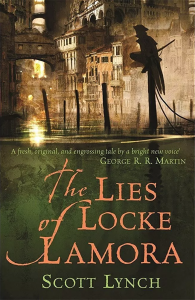Welcome back to Tomes & Tones, where we explore the uncanny pairing of books and music. We dig deep into the complimentary notion of reading a novel and feeling as if a particular record is synonymous with the experience; a soundtrack to the narrative offerings.
Each edition explores this synchronistic engagement as one of our writer’s divulges their experience with a particular book and album. We previously touched on Jack London with Follow the White Rabbit and Dean Koontz with Squarepusher. Join us as we delve into the world of violent fantasy and prog fusion.
Is there a more apt title to pair with a world set in a fantastical, fictional world than Maps of Non-Existent Places? A believable, lived in place that has never been, and a marker to explore what will never be. But there’s more to compare between the Gentleman Bastard’s first foray in Camorr and the New Jersey septet’s full-length debut than an oddly complimentary nomenclature. Today, we’re talking Scott Lynch’s fantasy heists in The Lies of Locke Lamora and the progressive fusion of Thank You Scientist.
The dulcet tones of Salvatore Marrano that lead in the “Prelude” of the album is short, and with little bombast. It does little to prepare the reader for what is to come, and yet, sets the stage nicely for the eclectic nature of the record. ‘Images of unfamiliar faces, making maps of non-existent places‘ fade in with long phrasing, intentions not unlike Lynch and his ‘toss you in the deep end first’ world building that thrusts unfamiliar territory while beginning to compose a broader picture of the narrative.
The prologue of Lamora’s journey follows the titular orphaned character as he is sold off to Father Chains – the eyeless God of Thieves and priest of the Crooked Warden – in a fashion that is slow of pace and equally unclear of future intentions while setting the tone nicely. In both cases, they are almost dull in comparison to what’s in store for the recipient, but an arguably necessary foundation for the whole of the experience.
And then “The Salesman’s Guide to Non-Existence” grips you.
Immediately, the true form of the music takes shape, with its eccentric mix of horns and sharp guitar tones bleeding into some lightly jazz inspired, pop-punk influenced melodies. Tempo changes moment to moment, unexpected surprises coming in every measure, while maintaining an effective through line that is easy to follow and highly engaging. The music is approachable despite the complex minutia of the microstructures and variety of style shifts, which can be largely attributed to the clean vocal delivery. Salvatore does a fantastic job of tying together a hodgepodge of prog, creating a very clear through line in the music.
Lamora’s voice is similarly what holds the reader’s hand through the dense topography and histories of Camorr, as well as the complex political structures of the Dons, Garristas, and Capas. Without such a perspective, the experience would quickly devolve into an overwhelming and daunting task.
His tale in earnest begins with similar outright engagement, in a text relevant, off-kilter display – in this case, mid-heist. Locke and his gang are thieves, the Gentleman Bastards, if you will. With Father Chains’ immense resources and teachings, the group is doubtlessly some of the most competent in their not-so savoury industry. A salesman of  lies, the ‘Thorn of Camorr’ and his companions work some highly creative and often skin of their teeth cons, the first true chapter of the novel notwithstanding.
lies, the ‘Thorn of Camorr’ and his companions work some highly creative and often skin of their teeth cons, the first true chapter of the novel notwithstanding.
“Feed the Horses” delves a bit deeper into the meat of the record, supplementing the brighter tones with a touch more edge and a comfort through clarity. This is the point where you settle into grooves, beginning to understand the direction of music and how each musician plays off each other. As the gang returns from their successful con, they, too, shed light on the shadier aspects of their work and explore the web of relationships that make up the Bastards and confidants. No less engaging than the start, but neither a dramatic shift.
Then we complicate matters with “Blood on the Radio”, combining the previous elements with some new flares in a more ambitious take. By now you can appreciate the additions to the mix – such as the mariachi intro or the straight jazz interlude – and the touches of assertiveness that flash in an impressive guitar solo toward the end. But if you’re looking to complicate matters, the emergence of the Grey King and his Bondsmagi the Falconer (who can control any whose name is known), not to mention a particularly gruesome interrogation a la the Capa and a bag of broken glass, are perhaps even more effective. Trepidatious agreements that can only be described as a forced hand and some displays of this world’s magic inject the world with a sweet and savoury flavour that complements the continuing development of the narrative.
“Absentee” is more melancholic in nature, with a contemplative ending passage that flows into the instrumental “Suspicious Waveforms”. While the former is more reflective in nature, the latter settles into the band’s comfort zone – pure jazz fusion. A nice divergence that fills out the listing experience. Locke takes this time to settle into his not terribly optimistic situation, followed by the continuation of a previous con in an equally comfortable way. These both work as a sort of prelude to the second half of their respective works.
“Carnival” interrupts this flow if more adventurous melodies and use of dissonance. It doesn’t deviate too far from what came before, but it does pull a little away from their aforementioned comfort zone. Now comes the introduction of the Spider, another highly informed and influential entity that further pulls at the crews marionette strings, and with this intervention we are swung into a series of unpleasant events. A disastrous confrontation leaves Locke stuffed and drowning in a barrel, near death. This pales in comparison to the pain he deals with as he finds most of his companions brutally murdered in their home.
The stakes have been raised, and both “Concrete Swan Dive” and “In the Company of Worms” do a great job of holding the pace using the previously introduced elements. Never forgettable and full of memorable melodies, but you have a firm grasp on what to expect at this point. Camorr has shared most of its underworldly secrets at this point as well, as we get a complex double con, false plague ships, a power play that unveils a new Capa, and eventually a suitable retribution that leaves the Falconer comatose with no tongue or fingers.
We are set up for one hell of a conclusion on both fronts, and both deliver with some of their strongest moments yet. “My Famed Disappearing Act” is the crowd pleaser, the first encore. A blistering pace, a wonderful chorus melody, and some fantastic musicianship really grab the listener – just listen to the guitar riff that opens the track. This is also the point where you can hardly put the book down, as one last deadly trap ensnares Locke during his final plans. A triple con (this almost sounds like a joke at this point) that ironically turns Locke into somewhat of an underappreciated saviour concludes business with the Spider, pays a healthy offering to the eyeless Thirteenth, and leads to a bloody finale with the new Capa. The song ends with a remarkable guitar solo and a reprieve before disappearing into a silent void, while Locke’s story has an equally isolated piece – the confrontation with the Capa was sans companions – and a twist before the titualar Bastards have their own disappearing act.
While a parallel through line can be pulled between both narratives, it’s the consistency in tonal shifts and the complex, upbeat, and at times sharply aggressive meanderings that illuminate the two as alike. Maps is progressive without the melodrama, and Lies is deeply fantastical while devoid of knights and dragons. A heavy dose of jazz fusion and inventive heists colour the DNA to be something far more unique than their contemporaries. They both have a modern feel to them that might not be up everyone’s alley, but is inarguably true to the creator’s intentions. Simply put, there’s more in common here than you might expect, and neither are something you should pass on.
Until next time, thanks for scrolling!






